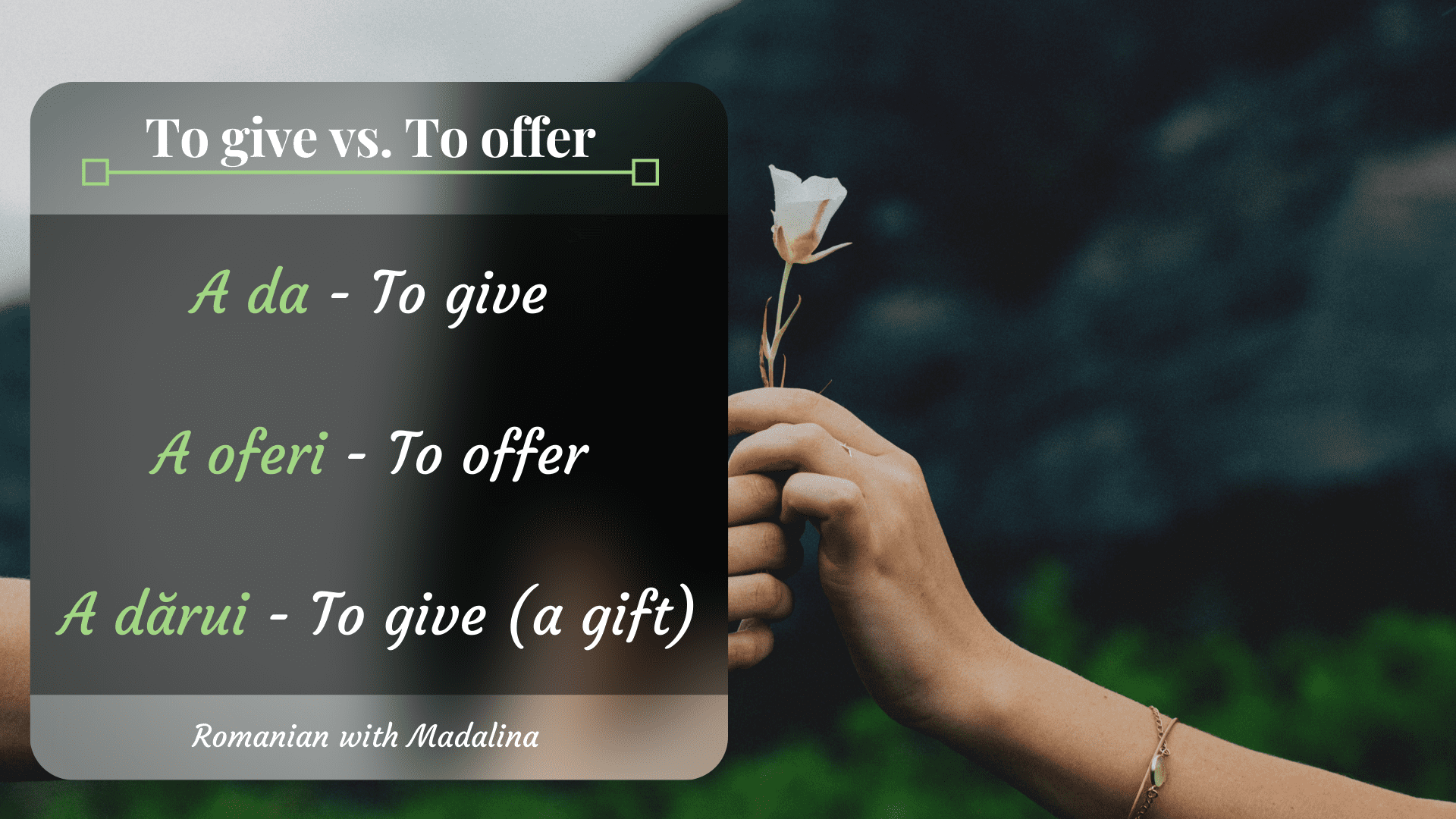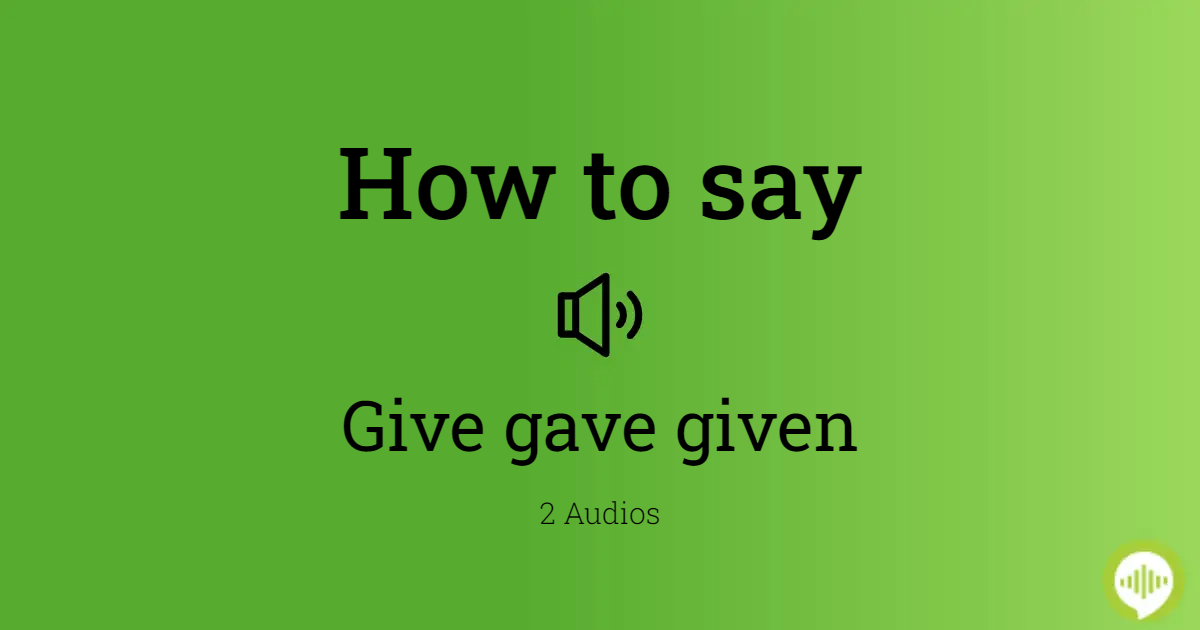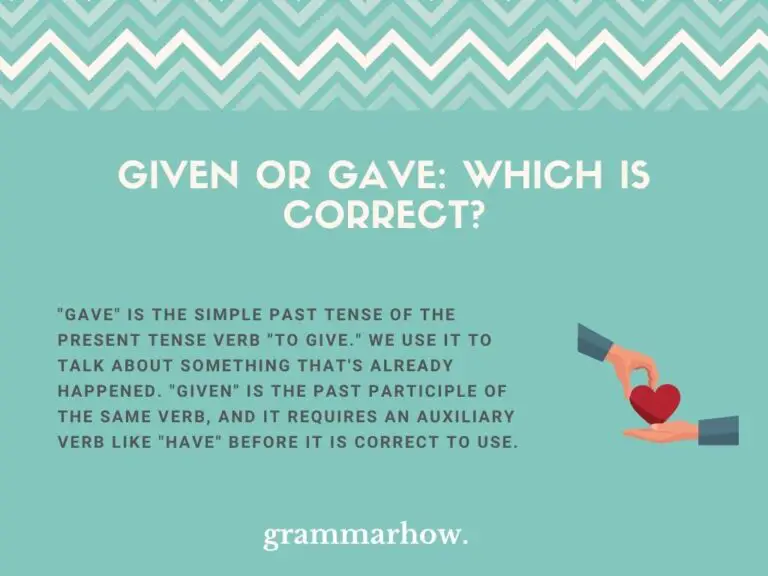
2 Timothy Chapter 1 Closer Day By Day
Contents What's the past tense of give? Forms of the verb give: What's the difference between gave and given? Examples of give in the present tense (used in sentences) Examples of gave in the past tense (in sentences) Examples of the past participle given (in sentences) Synonyms of give: Idioms with give: Origin of the word/verb give

Give In vs Give Up What's the Difference?
Definition: imp. of Give. (imp.) of Give; Example Sentences: (1) It was found that linear extrapolations of log k' versus ET(30) plots to the polarity of unmodified aqueous mobile phase gave a more reliable value of log k'w than linear regressions of log k' versus volume percent.

To Give vs. To Offer What's the difference?
Key Differences "Given" and "gave" are both derived from the verb "give," but they are used in different tenses and contexts. "Gave" is the simple past form of "give." It indicates an action of giving that happened in the past. For example, in the sentence "She gave him a gift," the action of giving is situated in a past time frame. Fiza Rafique

Giving Meaning of giving YouTube
"Given" is the past participle of the verb "give" and is used to indicate that something has been provided or supplied. On the other hand, "gave" is the past tense of "give" and is used to describe an action that occurred in the past.

How to pronounce give gave given
gifting vs. giving a gift When did we stop "giving" presents, and instead started to "gift" presents? I was taught that "gift" was a noun and not a verb, but it appears it is now used as the preferred verb to indicate the giving of a gift. Posted by alysondraper Filed in Usage 75 comments Share on Facebook Share on Twitter

Give and Grab Pvt. Ltd. Kathmandu
The Present Tense of "Give": Using "Gives" The present tense form of "give" is commonly utilized with the third person singular pronouns (he, she, it) and is expressed as "gives." This form of the verb signifies a present, habitual, or ongoing action. For example: She gives her time to charity voluntarily.

Phrasal Verbs GIVE in English English Study Here
Taiwan. Mar 7, 2018. #2. Use "gave". If you use "has given", it would imply she is still alive and giving brilliant and memorable performances. "Miss Smith worked for us for three years." (She is no longer working for us.) "Miss Smith has worked for us for three years." (She is still working for us.)

"God has given each of you a gift from his great variety of spiritual gifts. Use them well to
The correct past tense form of "give" is "gave." Therefore, "gived" should never be used in a sentence. Using "gived" instead of "gave" is a common mistake, but it is important to avoid it in order to communicate effectively.

Giving clipart 20 free Cliparts Download images on Clipground 2023
As verbs the difference between given and gave is that given is past participle of lang=en while gave is simple past of give. As a preposition given is considering; taking into account. As a noun given is a condition that is assumed to be true without further evaluation. As an adjective given is already arranged.

What Is Former Last Name? Trust The Answer
Nov 14, 2023. Give is a verb in its base form, used to describe the action of presenting, offering, or providing something to someone. It is used in the present tense for current or habitual actions. Gave, on the other hand, is the simple past tense form of Give. It is used to talk about actions that were completed at a specific time in the past.

Johan Derksen stopt ermee 13 Zet een kaars voor je.. vannacht Nieuws & Achtergronden (NWS
Giving vs Given. Give is a frequently used English word in both spoken and written language. Giving and given are two forms of the word that often confuse learners of the language. Many listeners struggle to pick up the pronunciation and may think of one word when they hear the other. Give means to donate or transfer, but it can also mean to.

Given vs Gave Identifying the Right Term for Your Context
"Gave" is the past tense of "give." It means to transfer something to someone else, usually as a gift or in exchange for something else. "Give," on the other hand, is the present tense of the same verb. It means to offer or provide something to someone else without necessarily receiving something in return.

ELTL Blog English (B) for Intermediate by Ayesha Zubair (2014901), Nazia Aslam (2014918
1 Answer Sorted by: 2 Both are correct, and it will depend on location which form is more commonly used. (I would consider had given to be the correct answer but gave would be ok.) kept is the imperfect form of keep, gave is the imperfect form of give and had given is the perfect form [of give].
:max_bytes(150000):strip_icc()/giving-and-receiving-presents-in-english-1212057_FINAL2-c505030df84e4ebda9bcbb6c8221aab2.png)
How to Give and Receive Gifts in English
Key Differences Give is a present tense verb that implies the act of presenting or handing something to someone, while gave is the simple past tense form of the same verb, indicating the action has been completed in the past. For instance, "I give you my word" is a present promise, whereas "I gave you my word" refers to a promise made earlier.

Given vs. Gave? Difference Explained (Helpful Examples)
Gave vs. Give — What's the Difference? Difference Between Gave and Give ADVERTISEMENT Compare with Definitions Gave Past tense of give. Apr 14, 2022 Give Freely transfer the possession of (something) to (someone) He gave the papers back The cheque given to the jeweller proved worthless She gave him presents and clothes Apr 14, 2022 Gave

Opposite Of Give, Antonyms of Give, Meaning and Example Sentences Antonym opposite words… Good
Key Differences. Given is primarily used as the past participle form of the verb "give." It can be used in various tenses, especially the perfect tenses, to indicate an action that has been completed. Gave, on the other hand, is the simple past tense form of "give" which denotes an action that occurred in the past. Sawaira Riaz.